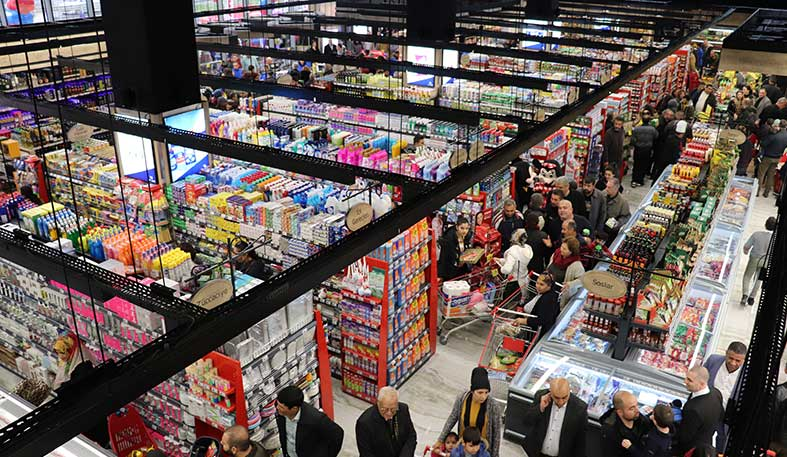April 14, 2024
We have lost hope in this country, shopkeepers say
The annual inflation rate in the northern part of Cyprus hit 94.5 per cent in March as Turkish Cypriots continue to experience the worst economic crisis in their history. Inflation compared to February rose by 6.9 per cent – the highest monthly inflation since the crisis began in 2021.
According to the official figures announced by the Statistical Institute, monthly food inflation in March was 3.4 per cent, which brought the food inflation to 220 per cent since 2022. The price of bread has increased by 25 per cent since the start of this year alone.
‘Bairam meal turns sour,’ a front page on daily Halkin Sesi read, reporting about the exorbitant food prices ahead of the Eid festival (Bairam) this week. The festival marks the end of the holy month of Ramadan.
Even though Turkish Cypriots are among the most liberal Muslims globally, the Eid festival is a very important time of the year when families come together for feasts and celebrations.
‘Barbecue remains a dream during Bairam,’ wrote Star Kibris. ‘Baklava is for the price of gold this Bairam,’ headlined Kibris Postasi.
The Turkish Cypriot economy has been in freefall since 2021 as the Turkish lira continuously declined in value against most major global currencies because of the unorthodox interest-rate-cutting policies of Turkish President Recep Tayyip Erdogan. The official currency in the north is the Turkish lira, which lost some 40 per cent of its value in the past year alone. It has shed a further nine per cent this year. Keeping rates artificially low led to skyrocketing inflation, placing Turkey among the top five inflation champions in the world along with Zimbabwe, Sudan, Venezuela and Argentina.
Annual inflation in Turkey in March was 68.50 per cent, while the monthly inflation was 3.16 per cent.
Last month, Turkey’s central bank raised its key interest rate to 50 per cent in an attempt to combat inflation. Policymakers cited a “deterioration in the inflation outlook.” The central bank predicts Turkish inflation will rise towards 80 per cent by the summer.
The north adopts the Turkish key interest rate.
The fall in the value of the Turkish lira affects Turkish Cypriots even more as the economy is almost completely dependent on imports. Even imports from Turkey are indexed to the dollar. Transportation and import costs are also exacerbated by a cumbersome public administration that creates additional expenses. Moreover, many goods, services and expenses such as real estate, cars, rent and school fees are in foreign currencies although people’s salaries are paid in Turkish liras.
The flow of foreign currency into the Turkish Cypriot market through the increasing number of foreigners living there has also worsened inflation as each sector started to determine prices according to the higher purchasing power of foreigners, according to economists. Unlike in a normal economy, where the value of the local currency would increase with foreign currency inflow, the value of the Turkish Lira didn’t increase as it is not determined by the Turkish Cypriot economy.
“The money inflow with uncertain sources plays a big role in the increase [in inflation],” Turkish Cypriot economics professor Engin Kara of Cardiff University wrote on his social media account. “In the near future, a large part of the economy will be comprised of this money.”
Soaring prices in the northern part of the island have left people, especially those on low or fixed incomes, with plummeting purchasing power and a decline in their living standards. The Cyprus Turkish Civil Servants Union (KTAMS) calculated that a family of four earning the minimum wage is living right at the hunger threshold.
According to KTAMS, the hunger threshold – the amount needed to maintain a healthy, balanced and adequate diet – for a family of four as of the end of March, was 23,644 Turkish Lira (about €687). The minimum wage in the north is currently 24,000 Turkish lira (about €697).
As Turkish Cypriots experienced a huge drop in their purchasing power leading to a decline in their living standards, they also saw their debts rocket.
According to the official figures of the Turkish Cypriot central bank, total borrowing from banks increased 61 per cent as of the end of 2023 compared to the previous year to 87 billion Turkish lira (about €2.5 billion). As of 2022, the total borrowing stood at 53.9 billion (about €1.6 billion).
Together with borrowing, the amount of non-performing loans also increased 58.2 per cent by the end of 2023 compared with 2022 to 4,176 million Turkish liras (about €121 million).
The uncontrollable price increases also deeply affect businesses that have to grapple with constant increases in costs. In the last two months alone, bottled gas and electricity prices increased 7.8 per cent, while fuel prices increased 10.8 per cent.
Head of the chamber of shopkeepers and artisans (KTEZO) Mehmet Ali Ardic told daily Yeniduzen last week there is a 70 per cent closing rate in small food and beverage businesses as they cannot keep up with the increasing costs.
“We have lost our hope in this country,” head of the association of restaurant owners Arif Bayraktar said. “We are just rowing the boat in vain. We are not getting anywhere.”
https://cyprus-mail.com/2024/04/14/the-worst-economic-crisis-in-turkish-cypriot-history/





